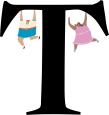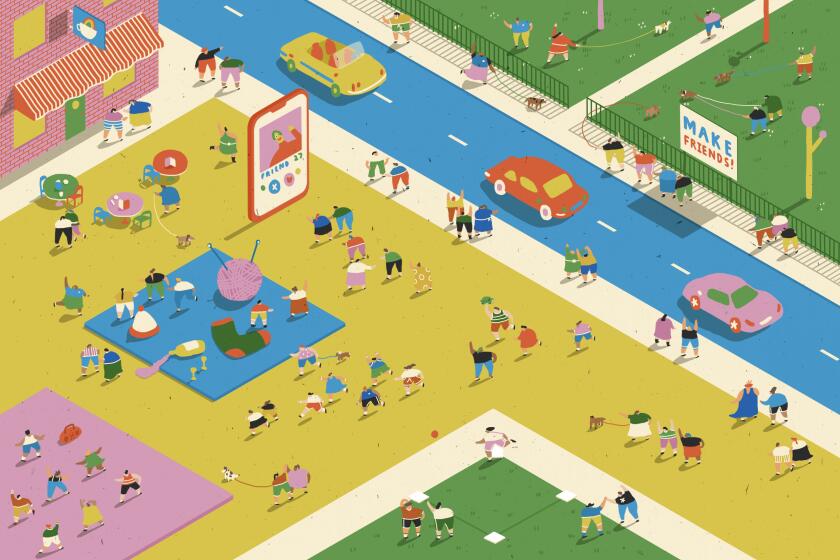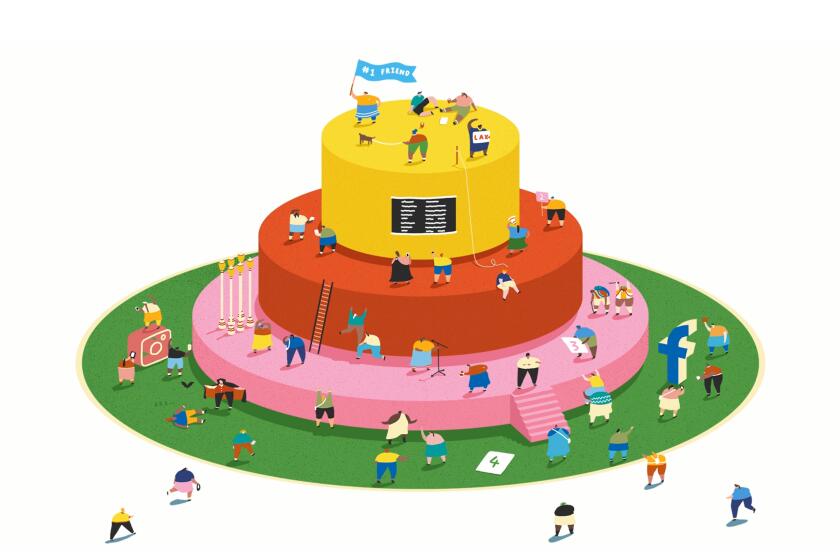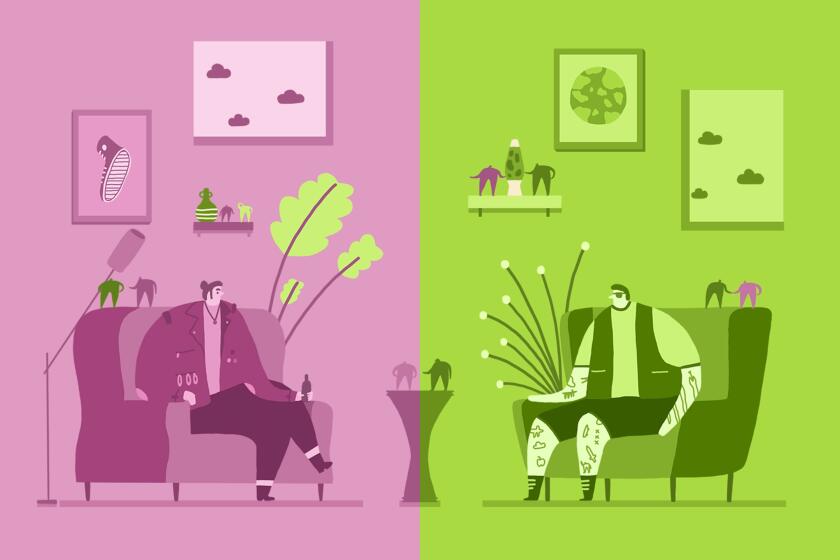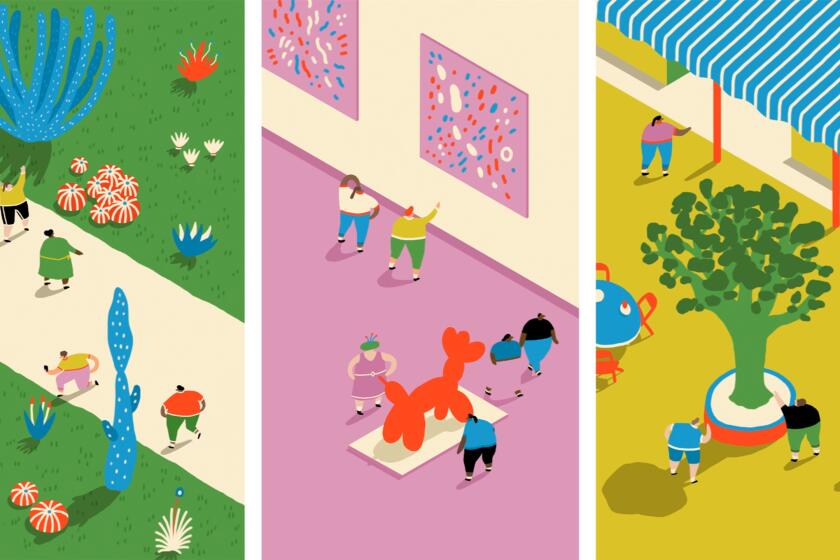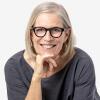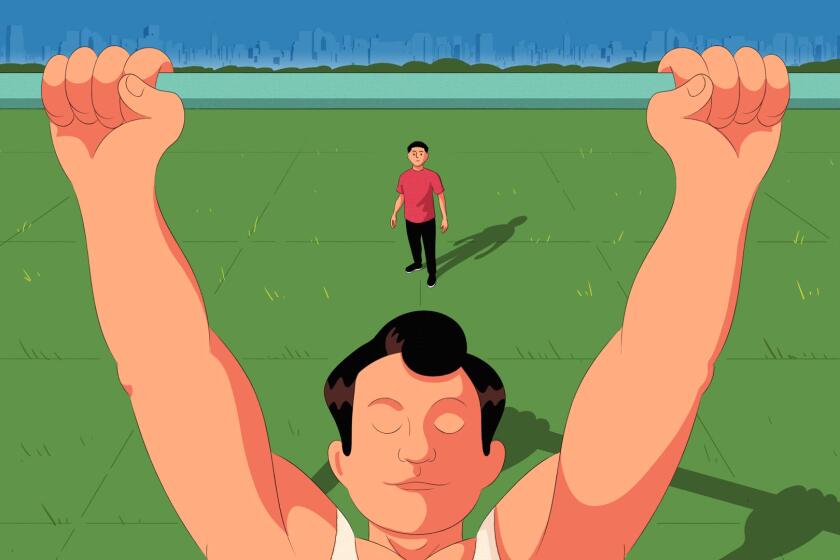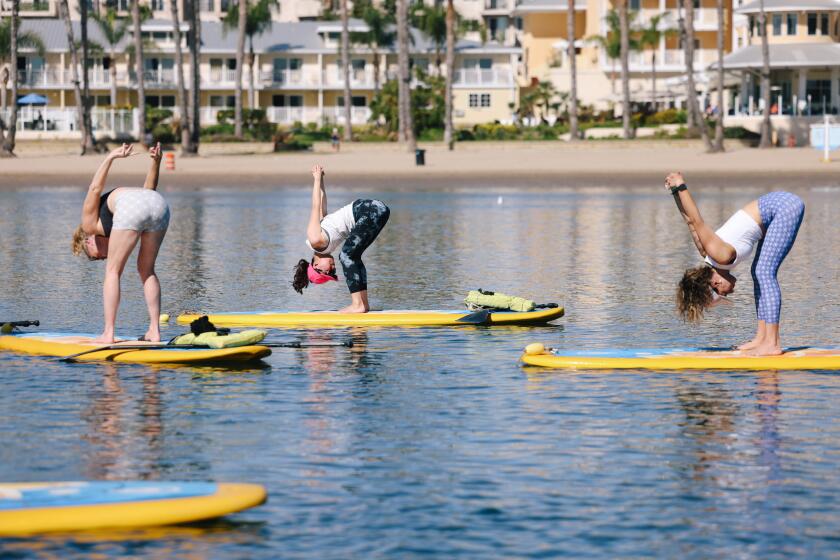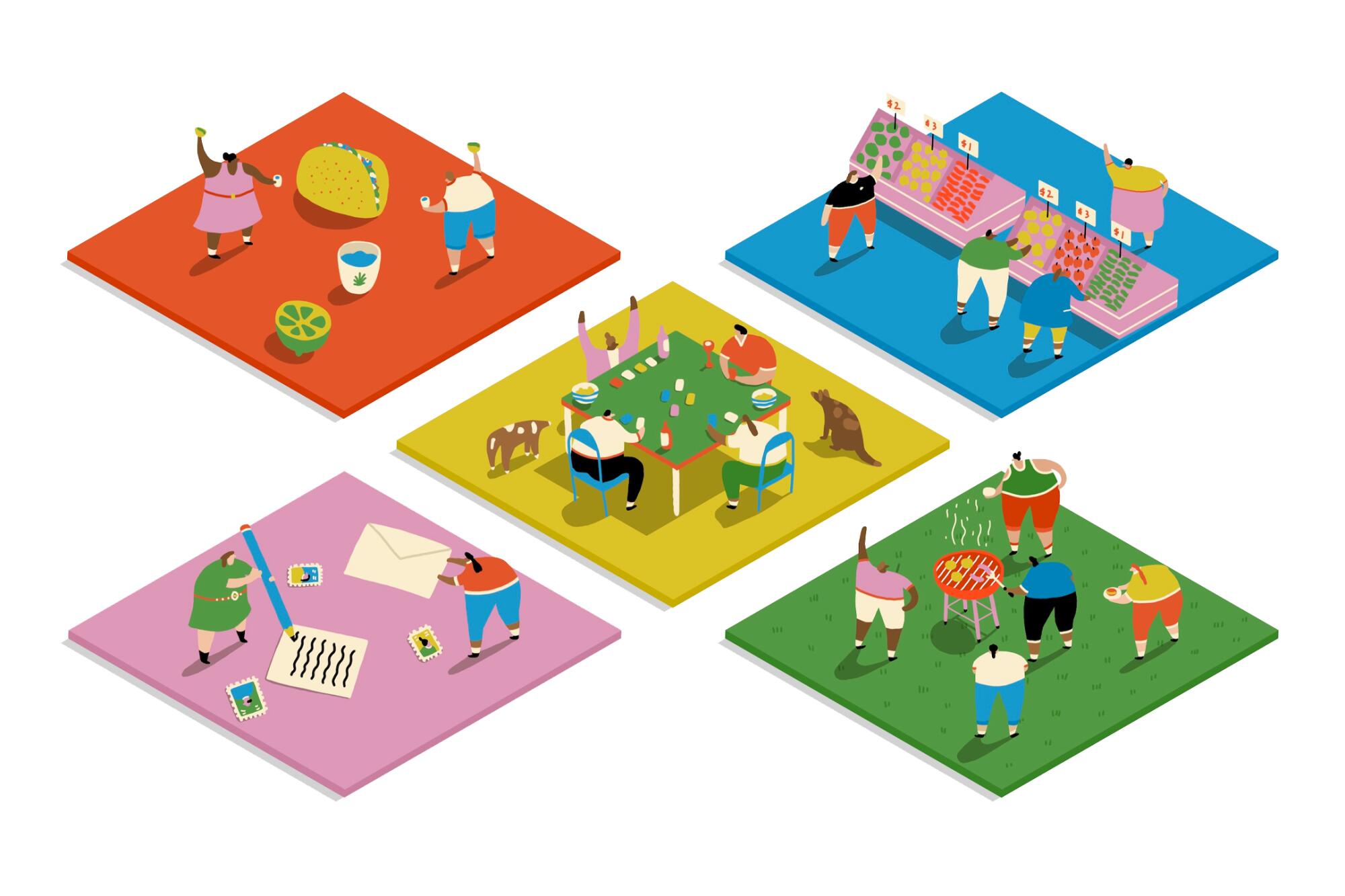
There are friends, and then there are the friends who got you through the pandemic.
“I was struggling and my neighbors literally kept me alive during the pandemic,” said Lauren Terschluse, 38, a mental health therapist who lives in Pasadena.
“I was living in an apartment community where people were taking care of each other. Every time someone went to the store, they would pick up things for others. I knew that no matter what, there were people that I could lean on and I was never alone. We developed these friendships because of the pandemic.”
Loneliness has increased substantially since the outbreak of the pandemic, with a third of Americans admitting to “miserable degrees of loneliness,” according to a Harvard study published last year. The researchers encouraged Americans to restore a “greater sense of responsibility to others and the common good” as a way to deal with social isolation. Some Angelenos did just that over the last two-plus years, balancing their desire for connection and support with their fear about the spread of a deadly virus.
They fed their hunger for community with a weekly game of Farkle and Rummikub. They were comforted by dancing to “It’s the End of the World as We Know It” in the backyard from six feet apart and handwritten letters and gifts from 2,000 miles away.
Friendship in L.A.
This story is part of a series exploring how we connect in a sprawling metropolis.
For many, the relationships that saved them during this hellish time never would have transpired, or been as deeply felt, if not for Southern California’s stay-at-home order in 2020. In the midst of a new COVID surge with Omicron subvariant BA.5, these friendships continue to be a guiding light through this dark time in history.
Building connection despite remote work
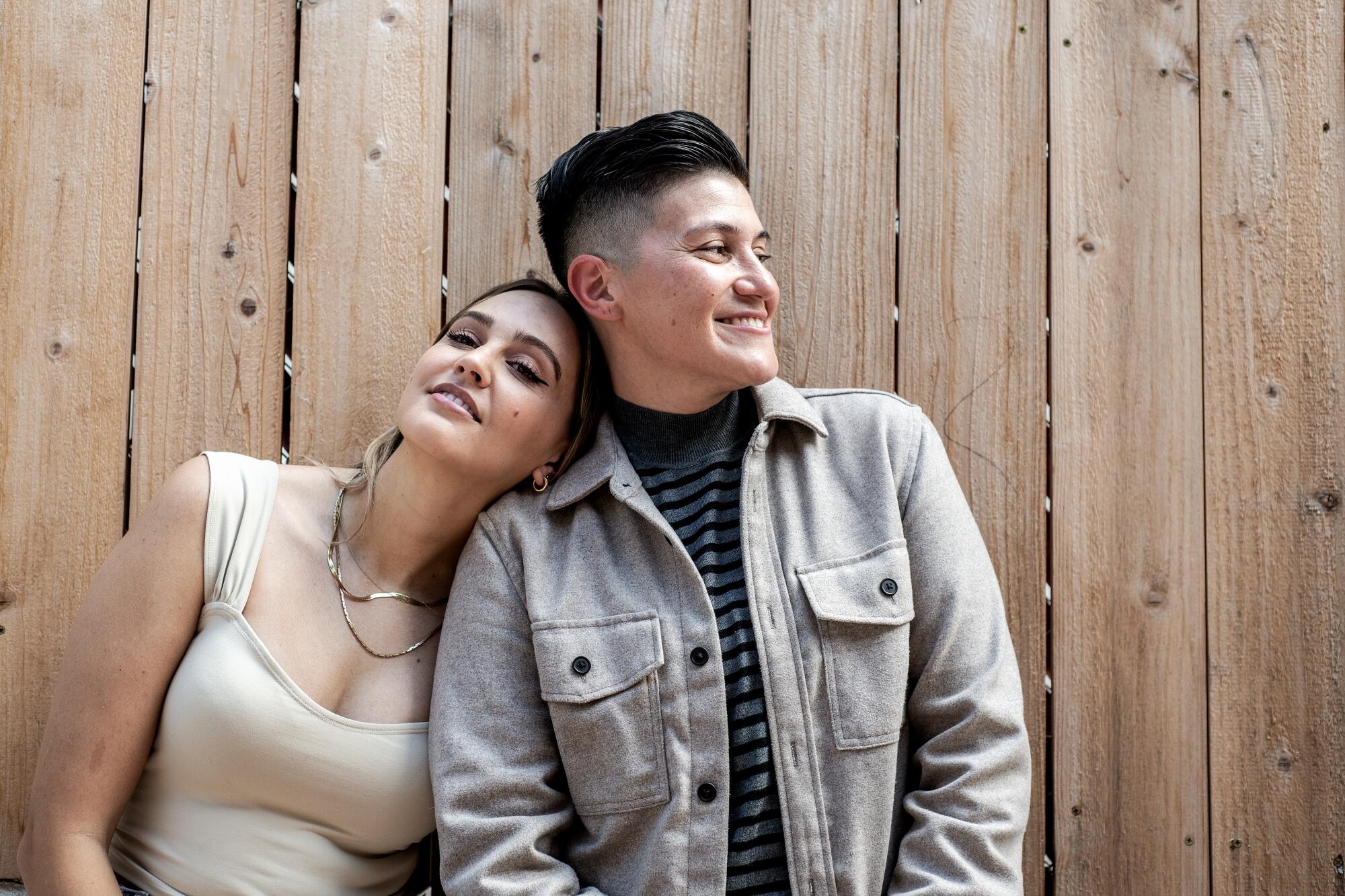
It can be hard to start a new job sequestered at home during a pandemic, and Meagan Alderson struggled to fit in after working at a tech company for only two months.
When her colleague Melbie Balam realized that Alderson was having a hard time, she decided to reach out to her regularly to make sure she was OK.
“With everyone remote, you didn’t have the same social interactions. You didn’t have people sitting with you at lunch and asking you how you were doing,” Alderson said. “Melbie and I would do weekly check-ins and I would raise concerns about struggles that I was having and how to navigate them. That’s how our friendship developed. She became a mentor and we realized we were similar and we had a lot of the same values. We quickly started relying on each other for personal things as well.”
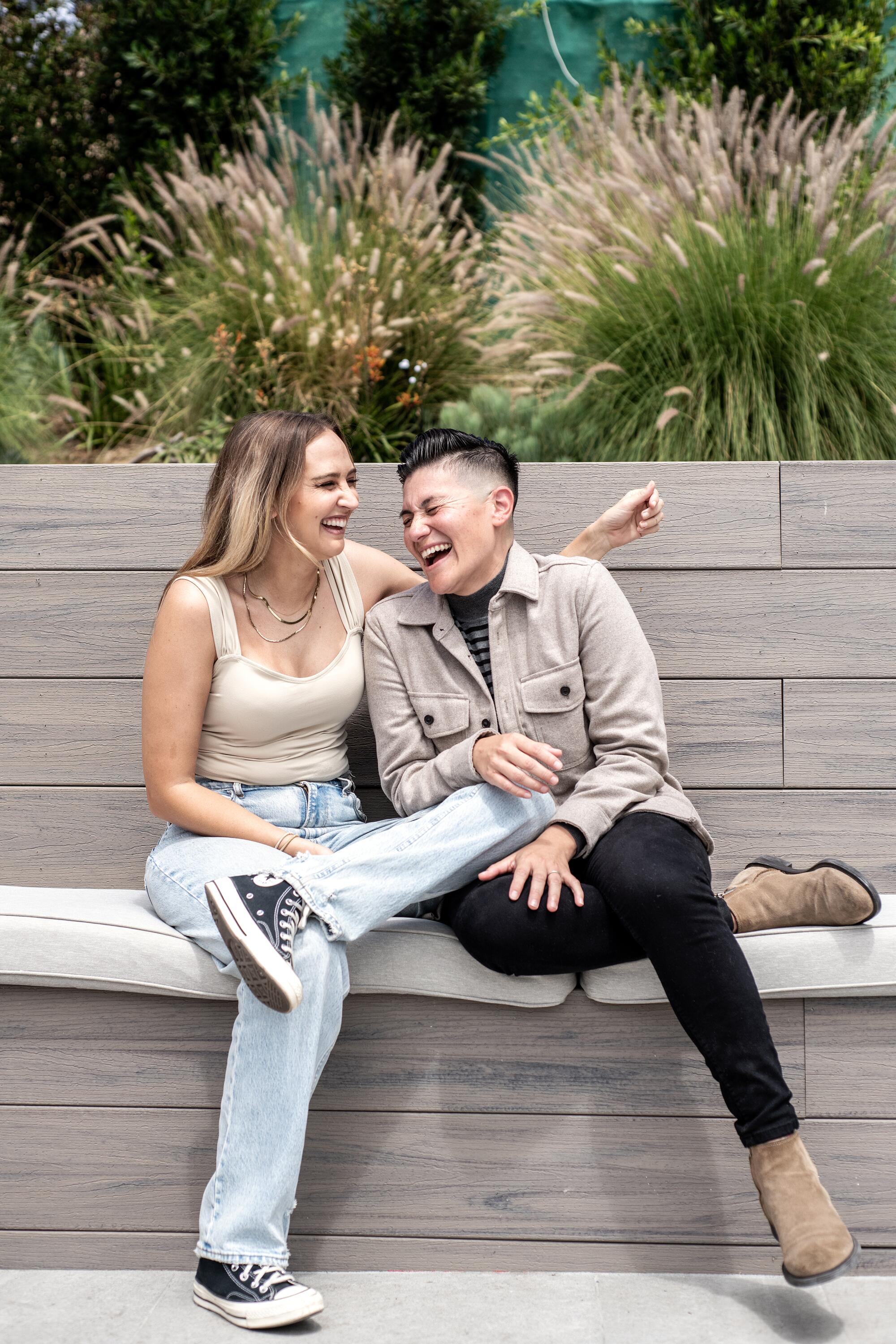
For Balam, Alderson became “the person that I could call and talk through things with, who always left me feeling supported.” Overwhelmed by endless Zoom calls, homeschooling and her partner’s new business, Balam said, Alderson helped her keep her life together. “If I had a bad day, she would drive over and we would talk. If she had things that she was going through, we were able to lean on each other through phone calls and video chats. What grew was a cross-mentorship. We helped each other bring value to each other. Other than my family, she is the one person who helped me through the social protests in 2020. I’m very outspoken. I’m a mobilizer in the community. She helped me to facilitate that.”
Over the last year, both have moved on to new careers: Alderson, 34, is a director of communications at Great Place to Work and Balam, 34, works in data security at TikTok. As Alderson watched some friendships fade and others deal with social anxiety as the world opened up, she acknowledged that her friendship with Balam has empowered her both personally and professionally.
“She is a constant. I know I can call her anytime and she will pick up.”
“Melbie changed my life in that she helped me and supported me and taught me how to advocate for myself,” she said. “She showed me my worth and helped me to believe in myself. I don’t know that I would have gotten my new job if not for her support and friendship. She believed that I was deserving of more. She is a constant. I know I can call her anytime and she will pick up.”
Balam puts it another way: “She is my soul sister. We will be friends for life.”
Kindness blooms in a unique micro-community
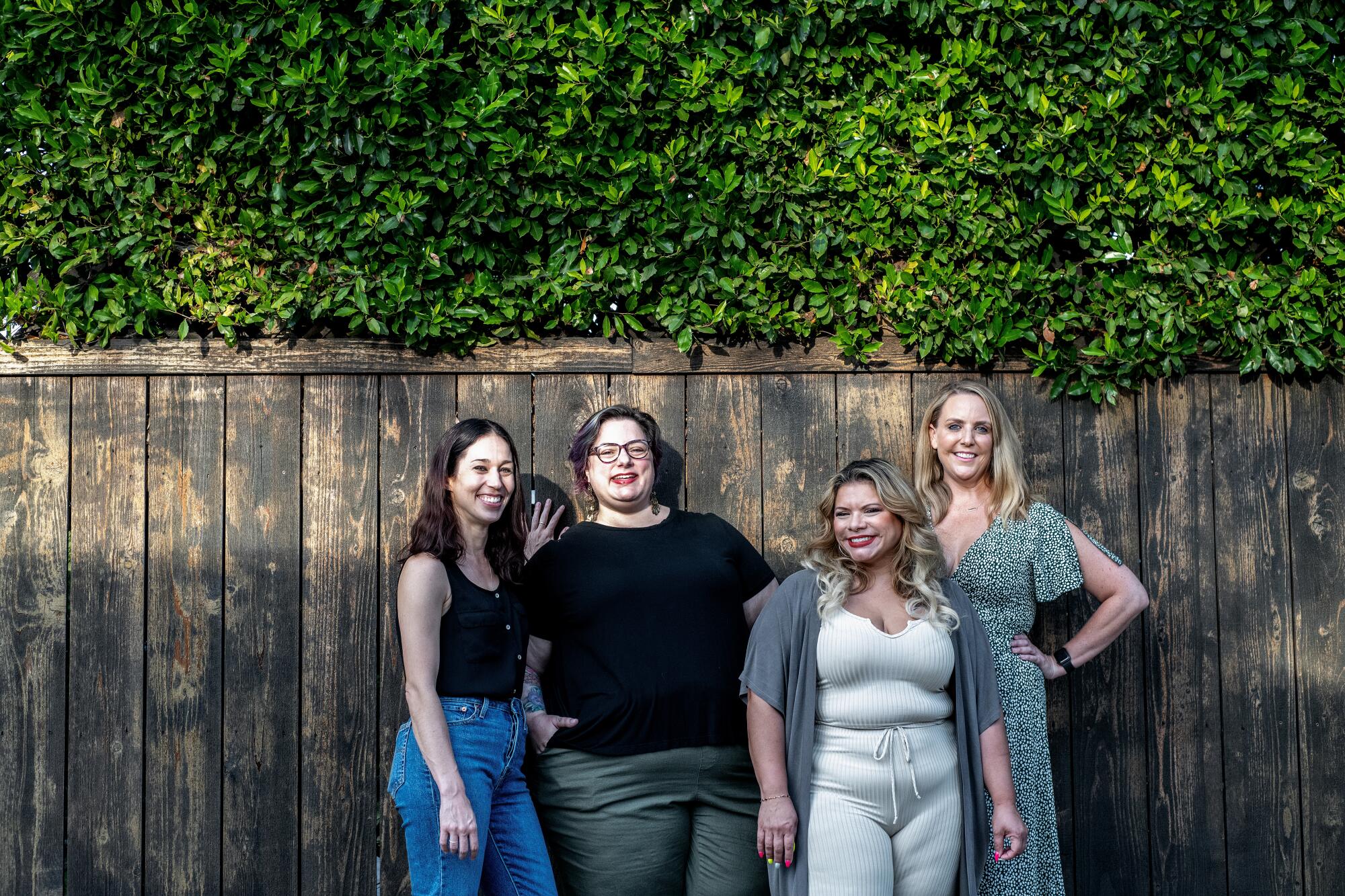
Days before the pandemic was announced, the residents of a small, multi-unit rental complex in Pasadena held a community meeting inside Amanda Timpson’s cottage and discussed what they could do to help one another if the city shut down.
“Everyone shared resources they might have access to and how we could help each other stay safe,” said Danae Horst, 42, owner of the Folia Collective plant store in Eagle Rock.
The residents started a text thread, and from that point on, anytime someone needed something — groceries, hand sanitizer, toilet paper, chocolate — or got COVID someone would step in to help.
“I wasn’t alone, but I felt alone,” said Cecilia Ramirez-Thomas, 47, who lived in one of the one-bedroom apartments with her 65-year-old mother and brother before moving to a larger unit.
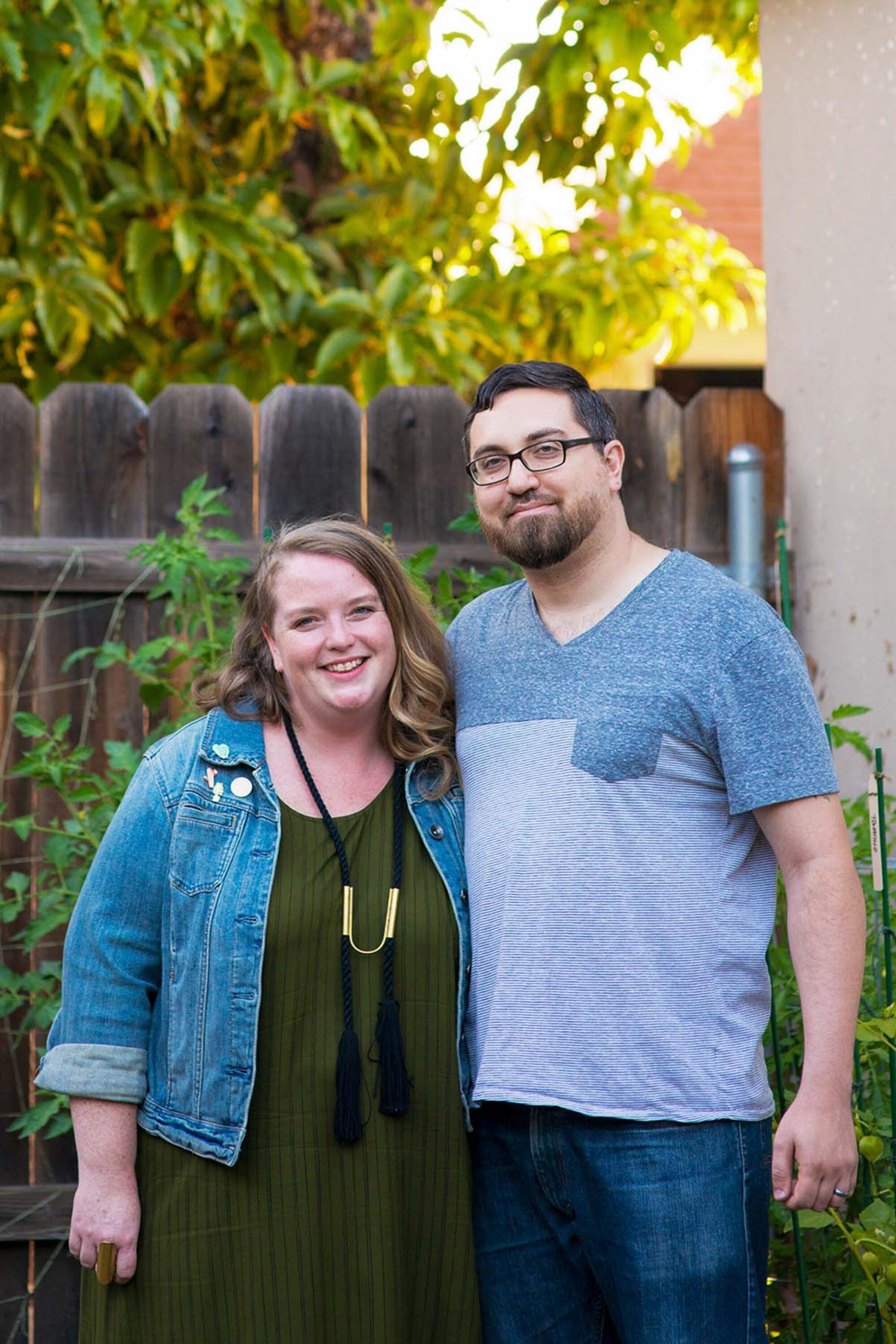
Therapy and the support of her neighbors helped her work through the depression that came from working at home during the pandemic. “It became this comforting community of neighbors and the friendships blossomed,” she said. “It was so nice to know that there was someone nearby and I wasn’t alone.”
After several months, Ramirez-Thomas, who directs a mental health agency, hosted a tacos and tequila night for her neighbors, who sat six feet apart in the property’s large backyard. There, Terschluse hosted a bridal shower for Ramirez-Thomas. When Horst was diagnosed with ovarian cancer, Timpson, a 44-year-old television producer, offered her washer and dryer to Horst and her husband, Bill, so they didn’t have to go to the laundromat. Timpson and psychologist Ashley Wilkins, 36, tended to a community garden and installed a gym in one of the garages. “I broke my foot walking my dog and couldn’t walk for eight weeks,” Terschluse said. “But I was living in a community where people were taking care of each other.” When people did grocery runs, no one ever asked for payment. “Friendship was the payment,” Ramirez-Thomas said.
At a time when neighbors complain about one another on Nextdoor, the pandemic fostered kindness in the tight-knit community and encouraged everyone to think of people other than themselves.
“It was less about meeting our own needs and more about asking myself, ‘What can I do today to help others?’”
“It was less about meeting our own needs and more about asking myself, ‘What can I do today to help others?’” Horst said. “The pandemic solidified the fact that we are all in this together.”
A new friendship provides refuge
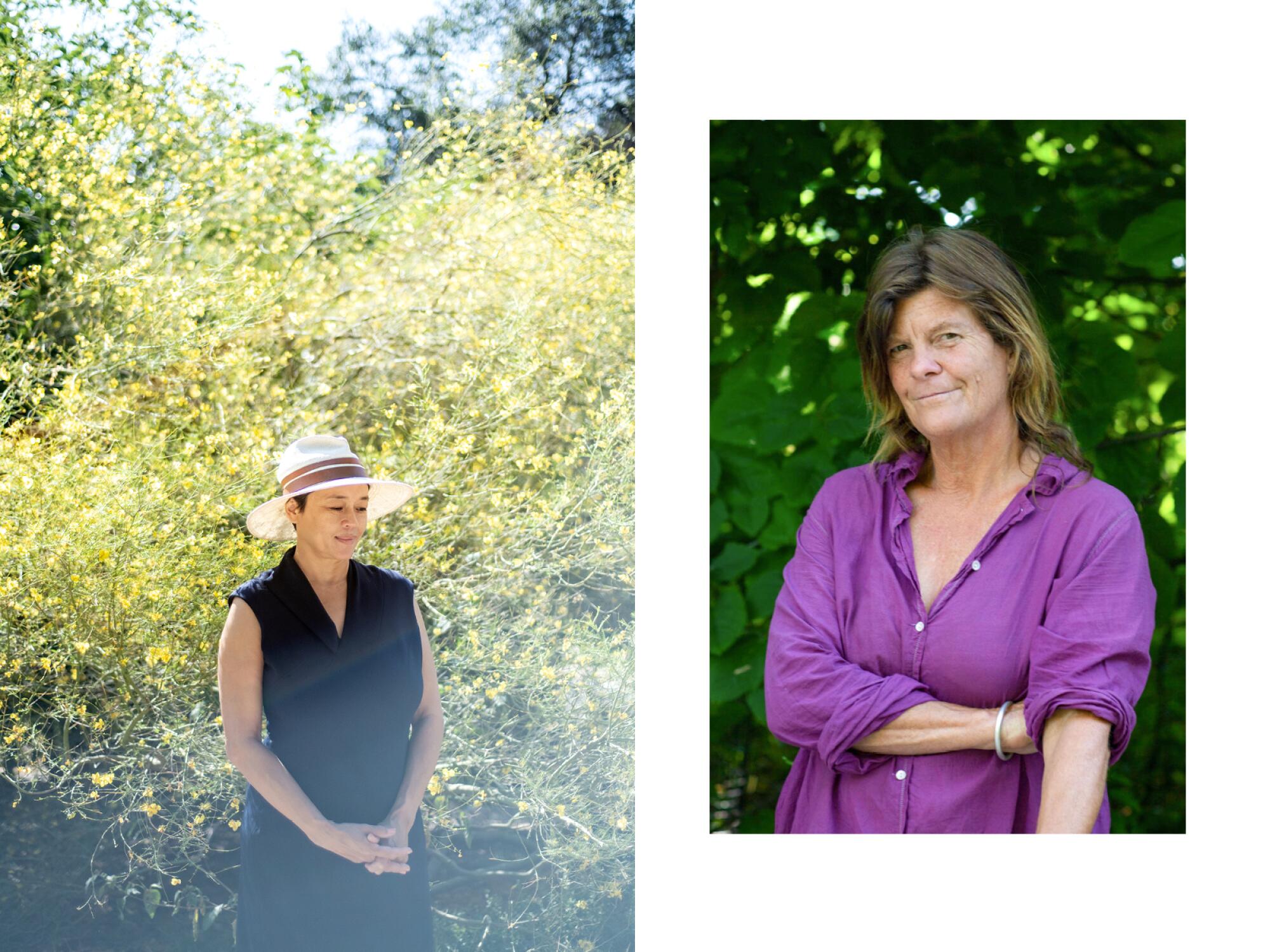
“As a Black and Asian woman, I didn’t feel safe during the pandemic,” said Michelle Matthews, executive director of Arlington Garden, a free public garden in Pasadena. “I didn’t want to go outside by myself.”
When she met soil ecologist Nance Klehm, 56, at a workshop at Artemisia Nursery in El Sereno in March 2020, she found more than a colleague who understood how she felt. She found a friend.
“She told me that she was scared,” Klehm said of the months that followed. “It was a fear that a lot of my friends felt and it was really hard. Adam Toledo was shot in my alley in Chicago,” she said of the 13-year-old Latino who was fatally shot by a Chicago police officer. “If someone had asked me if I would walk with them down the sidewalk, I would say yes. I will speak with you. I will be with you. I felt like we were all called to protect and support each other.”
Despite living 2,000 miles apart, the women stayed in touch through letters and phone calls. They even sent each other gifts, including photographs and ink made from walnuts and pokeberries.
“Every week, or other week, we would talk to each other,” Matthews said. “She is a teacher and a supporter and a mentor and was critical to helping me navigate the social and cultural climate of the garden.”
“We wouldn’t have had an opportunity to go to such a deep place so quickly if not for the pandemic.”
Klehm’s friendship, she said, helped her stay sane.
While her other friends with kids disappeared into their own lives, Matthews found a sounding board in Klehm. “I have a son and am a single mother, about to be remarried. She was a very close, supportive female in my life who gave me feedback on relationship issues. We might have had a friendship before, but we wouldn’t have had an opportunity to go to such a deep place so quickly if not for the pandemic.”
As the pandemic took a toll and people contemplated the connection between the earth and our future, many people turned to Klehm for advice. “That’s a lot to hold,” Klehm said. “I asked Michelle how she was reorienting with the social uprisings as a BIPOC person. How did she see this as an opportunity to expand her reach? I told her it was an entry point. I tried to open her deeper thoughts, and her heart, around how she felt and how she wanted to lead Arlington into the foreseeable future.”
They describe their correspondence as difficult at times, but necessary. “Anyone who was leading was forced to reorient,” Klehm said. “We had a lot of hard conversations and drew things out about each other. We had heartfelt, difficult conversations.”
In turn, Matthews supported Klehm emotionally as she felt overstretched and overworked.
“There are a lot of people that I don’t talk to anymore,” Klehm said.” I think there is something both tough and tender about Michelle that allowed us to connect.”
They found friendship — and love
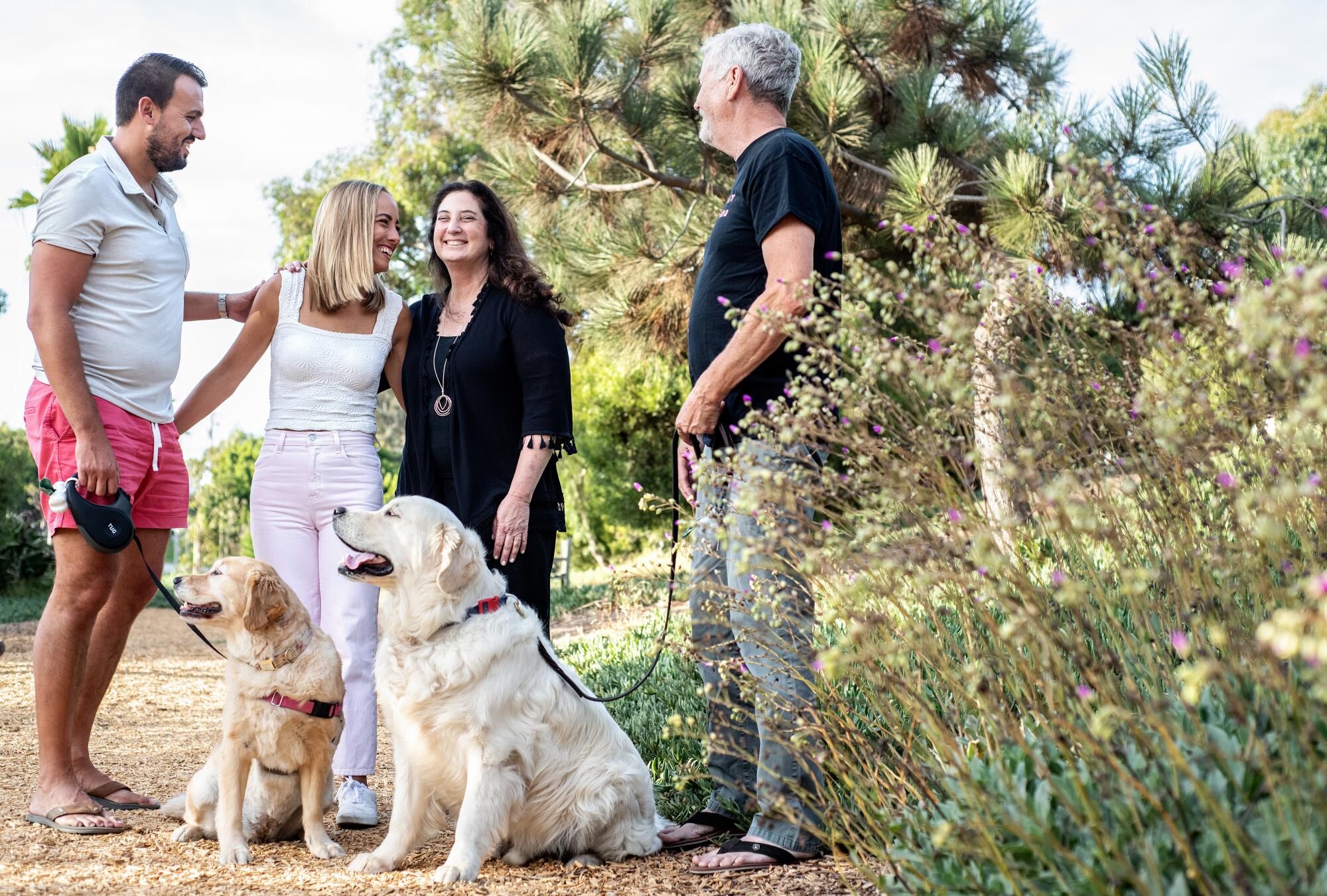
With its sprawling freeways and solitary, car-centric culture, Los Angeles is not known as an easy place to make friends. The pandemic made it even more difficult. So when Alex Curtis moved from London to Hermosa Beach two days before the World Health Organization announced the coronavirus had become a pandemic, he was pleased to bump into Dave Lee and his golden retriever, Hudson, a few doors down from his short-term rental.
“He was here all by himself,” Lee recalled. “He had nothing to do. I asked him if he wanted to come over for a beer.”
Beers led to dinner and dinner turned into a weekly game night with Lee, a 65-year-old retired photographer, and his wife, Robin, 56.
“The first night, he lost badly,” Lee said. “But he wanted to do it again. We had dinner and it became an official Saturday night game night. None of us were going out and we felt safe around each other.”
“They were the only people I knew, other than my colleagues,” Curtis, 37, added. “I would look forward to Saturdays when I would go over there and we would have a barbecue and play board games.”
As lockdown continued, Lee invited Nina Ruggiero, a neighbor he knew from the dog park, to join them. Eventually, after months of fierce competition over Farkle, Rummikub, Sequence and Chunky Monkey Business, Curtis and Ruggiero fell in love and started dating.
They’ve been together ever since, and even though the city has opened back up, the foursome and their two dogs still gather for weekly game nights, despite their significant age gap.
“Robin is someone I go to for advice, and we talk about how their friends joke that they hang out with us since they are our parents’ age,” said Ruggiero, 32, who is a digital editorial director at Travel + Leisure. “But we don’t think about the age difference.”
The four friends bowl together, look after one another’s dogs and host each other’s birthdays. “Dave’s always been there as a friend to help me out, be it with fixing my car, attempting to teach me how to roller skate or just creating a killer playlist for game night,” Ruggiero said. “And I’ve been there to help taste-test all the bread he taught himself to make during the pandemic.”
Asked if he and his wife were playing matchmaker, Lee said that it was not his intention. “My wife wasn’t surprised at all, though,” he said with a laugh. “Alex out of nowhere realized he had a lot of feelings for Nina. It was like a Hallmark movie.”
For anyone struggling to make friends in L.A., Lee offers this tip: “Get yourself a dog and get out there.”
Her sister was there when she needed her
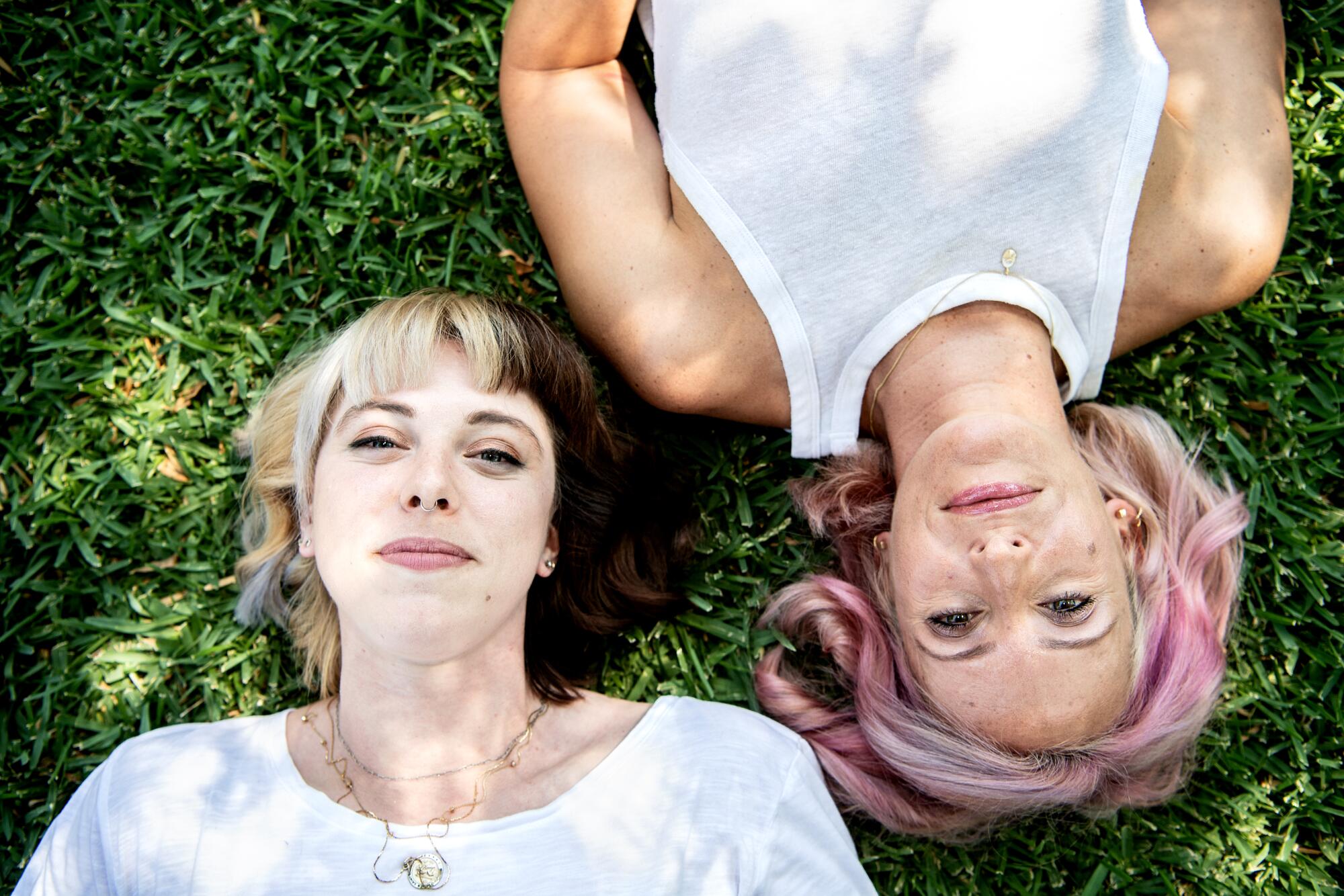
“I don’t have the capacity for surface-level relationships anymore,” said Christina McGoldrick, 37, a public relations director who lives in Santa Monica.
While she acknowledged how destabilizing COVID-19 has been on her mental health and the health of others, Christina also expressed gratitude that the pandemic strengthened her relationship with her sister Jillian, who is 10 years younger.
“I told her early on that I was really struggling with my mental health,” Christina said. “Every day we wake up to more terrifying news. She started texting me at least once a week — it didn’t have to be an official check-in, though sometimes it was. Sometimes it was a funny meme, a cute animal video or a series of ridiculous TikToks. The feeling of knowing she was thinking about me and always a phone call away helped get me through the darker days.”
Growing up, Christina saw herself as a mentor to her younger sister, but as Jillian has grown into adulthood, the older sister now views their relationship as a dual mentorship.
“We were close before, but the pandemic has brought our relationship to a deeper level,” Christina said.
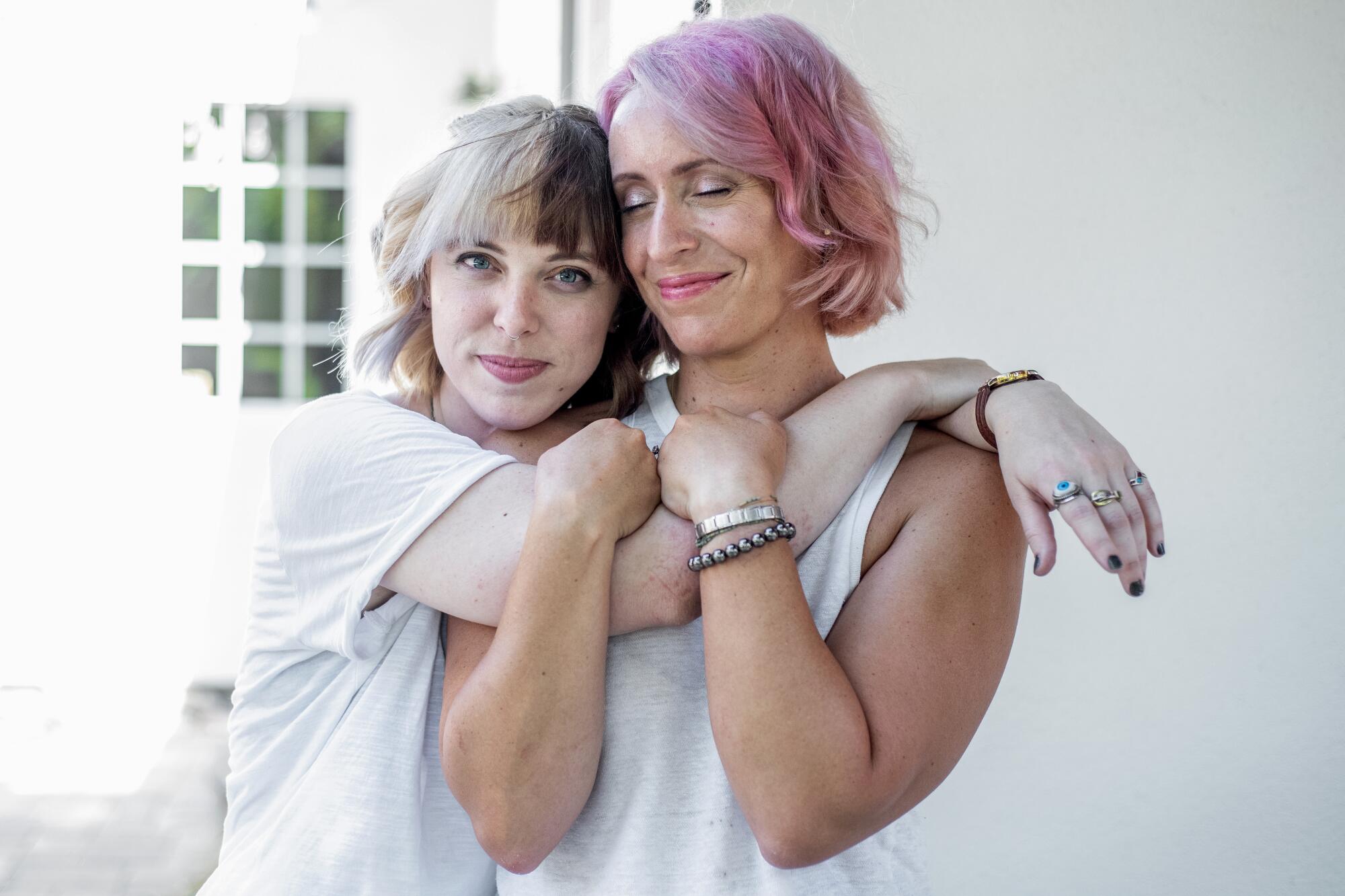
Working from home, Jillian felt isolated and alone and reached out to her sister for support. “My mother died when I was 5, and [Christina] has always made me a priority,” she said. “But over the pandemic, we were experiencing similar things and were able to connect a lot more and really be ourselves.”
During the pandemic, Christina said the sisters would “show up for one another in quiet ways,” such as talking on the phone and meeting for picnics with their dogs at Clover Park in Santa Monica.
“I don’t have the energy for relationships that aren’t restorative anymore.”
Both admit that some of their other relationships did not survive the pandemic due to fights over everything from mask-wearing to election fraud, but they managed to become closer through their shared values.
Christina adds: “I don’t have the energy for relationships that aren’t restorative anymore. Joy is a radical movement. If you can find joy in this time, that’s rebellious.”
When a neighbor becomes your lifeline
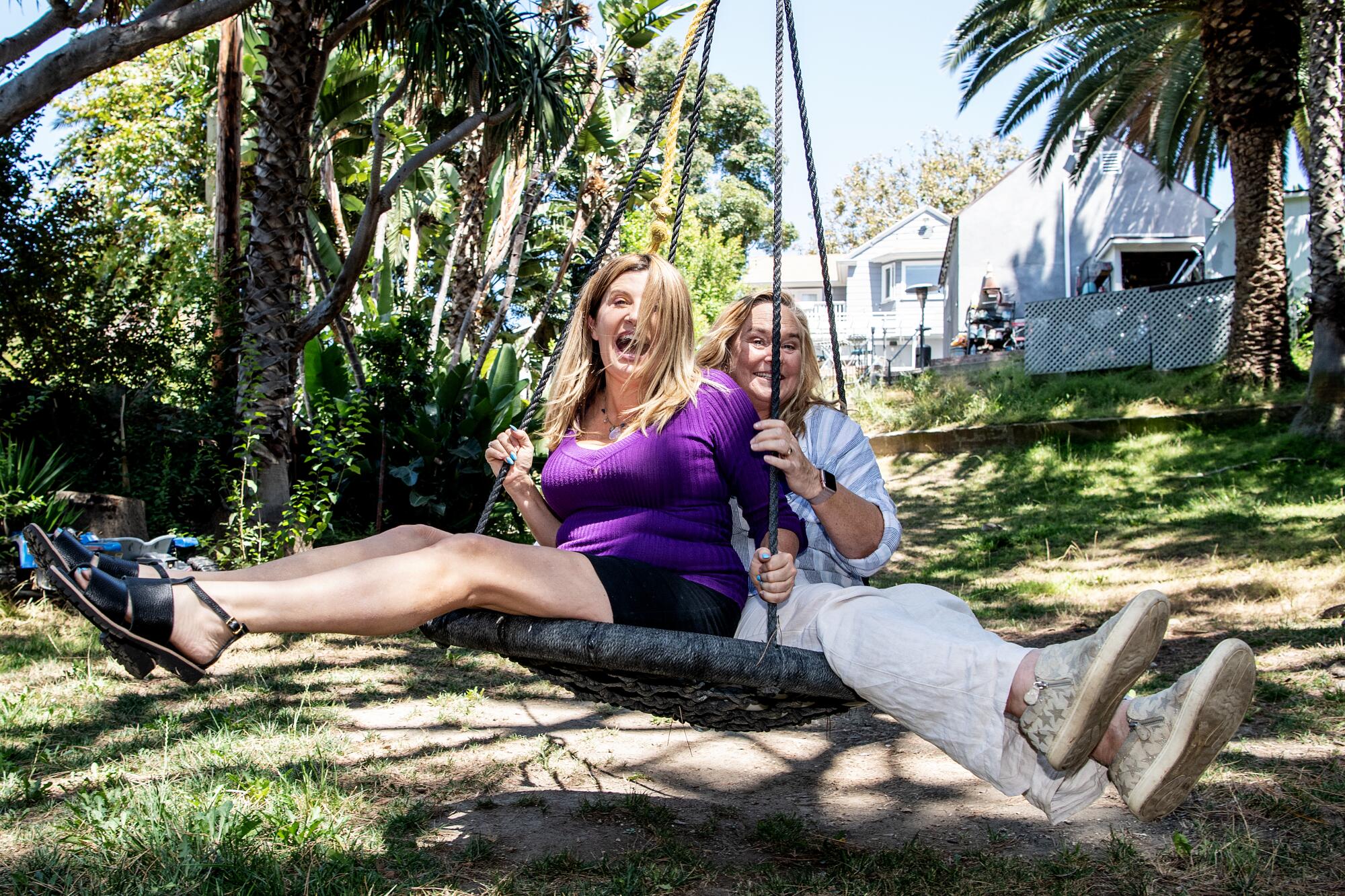
“I felt like I was living in [the movie] ‘Bird Box,’” said Daphne Brogdon, who describes herself as someone who thrives on social interaction. “I would walk down the street and people would cross the street for fear that we might kill each other. I was being careful. But I needed a friend.”
Brogdon tried putting chairs out on her lawn six feet apart for visitors, but no one felt comfortable socializing during the early days of the pandemic. She attended a virtual wine tasting on Zoom, but it only made her realize how much she needed to socialize in person.
When she invited an acquaintance, her equally social neighbor Christie Thomas, to attend the next virtual wine tasting outdoors with her, she was delighted when Thomas accepted and invited her to watch the Zoom tasting on a laptop in her backyard.
“It was so much fun,” Brogdon said. “It became something we did regularly.”
During their alfresco wine tastings, the two realized they had a lot in common.
“There were months when Christie was the only person I saw, along with my kids.”
“I joke that Daphne and I are the same person born on different coasts,” Thomas said. “We are around the same age, we both had mothers who were educators and believed in public school education.”
When Thomas, 56, an institutional giving manager for 826LA, struggled with the isolation and monotony of working from home, Brogdon offered a reprieve. “I felt horrible,” Thomas said. “But I knew that I could always text her and say, ‘I’m going to walk the dog, do you want to join me?’ We both love food and wine, and I would look forward to our virtual wine tasting on Fridays. It was so fun to make a new friend. I felt like I was in high school.”
A year ago, Brogdon lost her husband, noted Los Angeles chef Mark Peel, suddenly to cancer.
“He went into the hospital and suddenly he was dying,” Thomas said. “Daphne was in shock. I remember her calling me and being very concerned about her kids.”
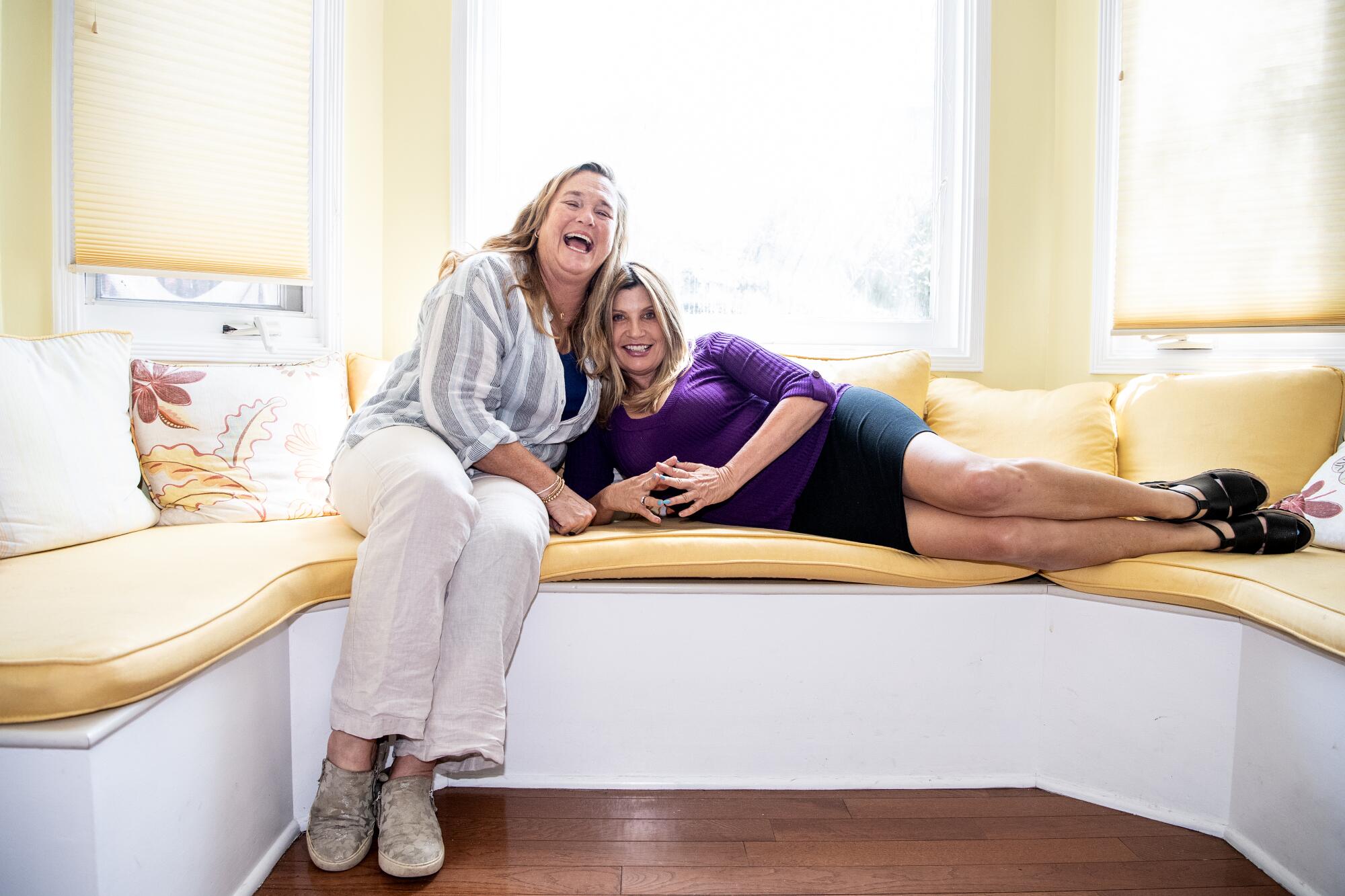
When Brogdon and Peel’s daughter turned 16 in the fall, she requested one thing for her Sweet 16 party: The chocolate fountain that her father would meticulously prepare for family functions.
Brogdon couldn’t face the chocolate fountain. “I was humble and asked for help,” she said, her voice breaking. It was Thomas who stepped up and made the chocolate fountain happen for the family.
Looking back, both women said they probably would not have become close friends before the pandemic, given their busy lives.
Now Brogdon marvels at the support and acceptance she received from her “pandemic bestie.” “There were months when Christie was the only person I saw, along with my kids,” Brogdon said. “I was incredibly dependent on that friendship.”
It's a date
Get our L.A. Goes Out newsletter, with the week's best events, to help you explore and experience our city.
You may occasionally receive promotional content from the Los Angeles Times.
